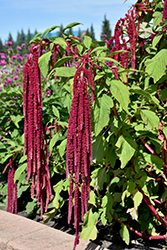It's all about ...
plants

Height: 4 feet
Spread: 3 feet
Sunlight:
![]()
Hardiness Zone: (annual)
Other Names: Love-Lies-Bleeding
Description:
A beautiful and stunning selection that stands out in garden beds, containers or in fresh cut bouquets; long, drooping, softly scented, cherry red flowers are showcased in the summer months; an easy to grow variety with little maintenance needed
Ornamental Features
Love Lies Bleeding features bold chains of cherry red flowers dangling from the stems from mid summer to early fall. The flowers are excellent for cutting. Its large textured pointy leaves remain green in colour throughout the season.
Landscape Attributes
Love Lies Bleeding is an herbaceous annual with an upright spreading habit of growth. Its relatively coarse texture can be used to stand it apart from other garden plants with finer foliage.
This is a relatively low maintenance plant, and may require the occasional pruning to look its best. It has no significant negative characteristics.
Love Lies Bleeding is recommended for the following landscape applications;
- Accent
- General Garden Use
- Container Planting
Planting & Growing
Love Lies Bleeding will grow to be about 4 feet tall at maturity, with a spread of 3 feet. The flower stalks can be weak and so it may require staking in exposed sites or excessively rich soils. This fast-growing annual will normally live for one full growing season, needing replacement the following year.
This plant should only be grown in full sunlight. It does best in average to evenly moist conditions, but will not tolerate standing water. It is not particular as to soil type or pH. It is somewhat tolerant of urban pollution. This species is not originally from North America.
Love Lies Bleeding is a fine choice for the garden, but it is also a good selection for planting in outdoor pots and containers. With its upright habit of growth, it is best suited for use as a 'thriller' in the 'spiller-thriller-filler' container combination; plant it near the center of the pot, surrounded by smaller plants and those that spill over the edges. It is even sizeable enough that it can be grown alone in a suitable container. Note that when growing plants in outdoor containers and baskets, they may require more frequent waterings than they would in the yard or garden.
